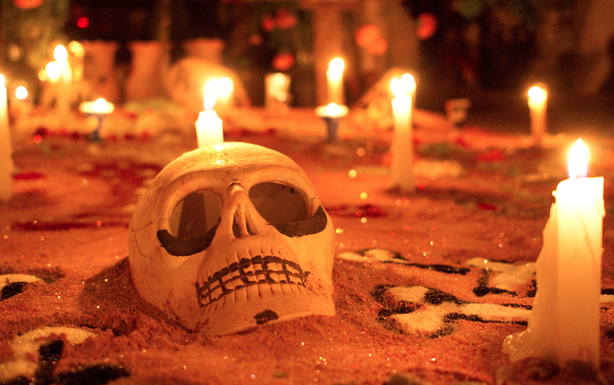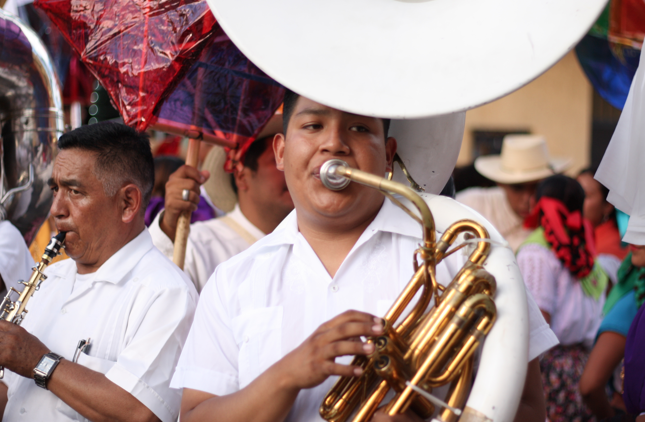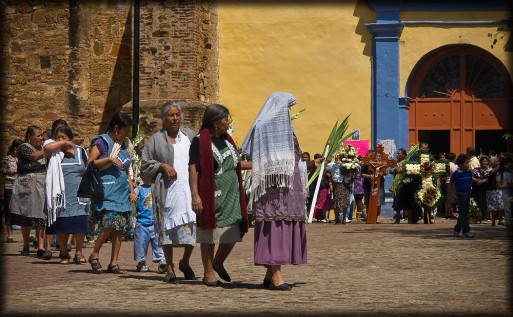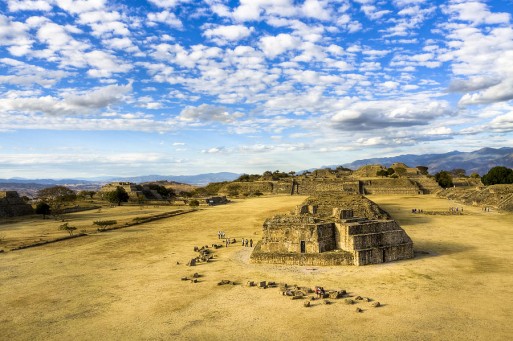Earlier this month, SevenPonds discussed the rich, ancient history of the Zapotec people and their perspectives on death and dying. Then we wondered: what is the current status of the Zapotec cultural precense, particularly surrounding death, dying, and funerals?
“It was not the kind of thing the average tourist hears,” writes travel blogger Curt Rosengren, “[But] then again, Zapotec funeral processions aren’t your average tourist activity.” Rosengren was recalling the moment he came across a traditional Zapotec funeral while visiting Oaxaca, Mexico in 2001. Traditional Zapotec beliefs on death and dying differ greatly from those that influence the traditional US funeral – particularly in their penchant for celebration. While a traditional US funeral is usually a somber and quiet event, Zapotec funerals are embraced as an opportunity to honor the life of a loved one by celebrating their passing colorfully. When Rosengren ran into a funeral, he ended up participating in an end of life ceremony of music and family where the mescal flows freely. “[The] sounds of [a] brass band led me through Teotitlàn del Valle’s dusty streets to discover [the funeral],” writes Ronsengren, “It was trudging slowly before a group of mourners as a funeral procession left the town’s red-domed 17th century mission church.”
The Zapotec citizens of current day Mexico uphold a culture that harkens back to one of Mesoamerica’s most ancient and impressive civilizations. Though lesser known than the Mayan and Aztec peoples, the Zapotec civilization began in Oaxaca at the start of the fifth century B.C., where it flourished for over a thousand years. The ancient Zapotec city of Monte Alban still remains in Southern Oaxaca – a towering testament to the Zapotec culture’s rich artistic and intellectual history.
The ancient civilization’s creation myths tell of a time when the Zapotec people were descended from supernatural beings who lived amongst the clouds, known as the “Be’ena’ Za’a.” When a loved one died, the Zapotec believed he or she would thus return to the clouds that initially gave them life.

Many aesthetic elements of Dia de los Muertos find their way into funeral ceremonies.
(Credit: swampthings)
Ostensibly, this Zapotec concept of “returning to the clouds” echoes Christian concepts on heaven. While the two share a kind of ‘heavenly’ spiritual motif, this Zapotec creation myth was just one of many in a civilization that worshipped a wide array of deities. Indeed, another popular Zapotec creation myth finds the goddess Huichaana, ruler of the moon and tides, as the creator of the Zapotec. In this account, the Zapotec come not from the clouds, but the soil.
Like the Mayan and Aztec cultures, the Zapotec remain known for the importance they placed on storytelling and ceremony. Though we’re now long past the fifth century, the grandiose elements of contemporary Zapotec funerals seem to speak to these ancient traditions in their unabashed form of expression. “A strange blend of wailing grief and casually cheerful festivity lent a surreal cast to the occasion,” stated Rosengren, “The thick sweetness of copal, a ceremonial incense, enveloped the mourners. The women’s brightly embroidered smocks countered the solemnity of the occasion. Grey shawls hid vibrantly colored ribbons woven through long braided hair.”
It would be a disservice to the Zapotec culture to regard these funeral services as big parties – even if that’s what they are during certain moments. In truth, they serve as inclusive, dynamic ceremonies for community members to laugh and mourn for the life of a loved one.
Even after thousands of years, the Zapotec have retained the expressive, vibrant nature that first solidified their civilization as one of the history’s most remarkable cultures.
Have you ever observed a traditional Zapotec funeral in Oaxaca, Mexico? We look forward to your comments below.
You may like:
- SevenPonds’s article on death and dying in the Aztec civilization
- SevenPonds’s article on Dia de los Muertos
- SevenPonds’s article on India’s Holi Festival

 Oaxaca, Mexico: The Contemporary Zapotec Funeral
Oaxaca, Mexico: The Contemporary Zapotec Funeral





 Recovering Cremation Remains After the Los Angeles Fires
Recovering Cremation Remains After the Los Angeles Fires
 “As Tears Go By” by Marianne Faithfull
“As Tears Go By” by Marianne Faithfull
 “The Sea” by John Banville
“The Sea” by John Banville














